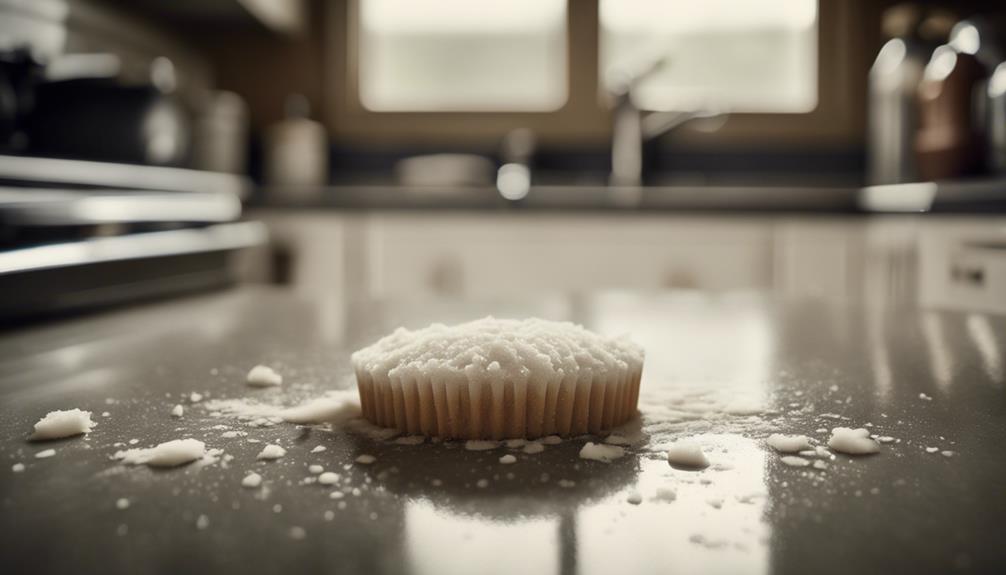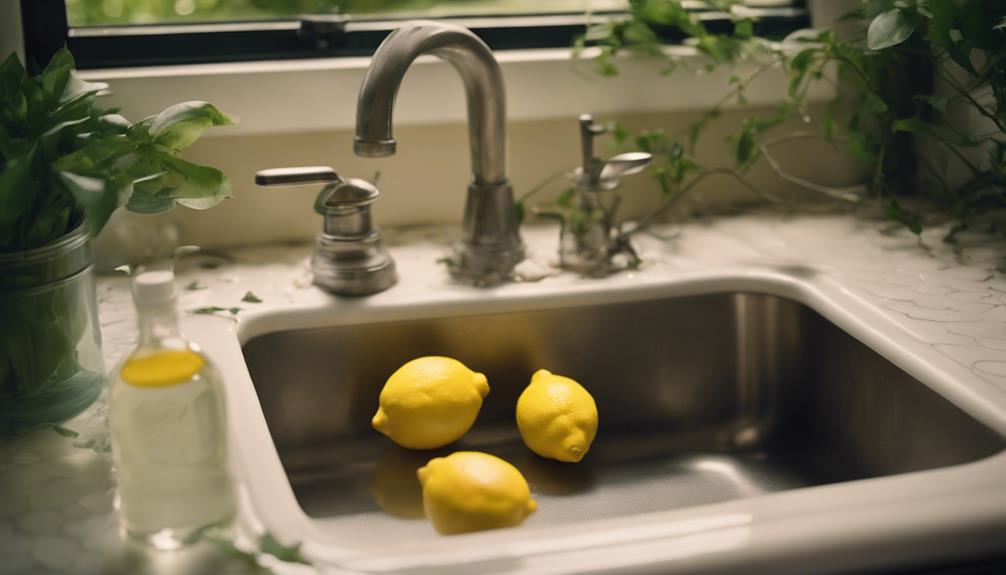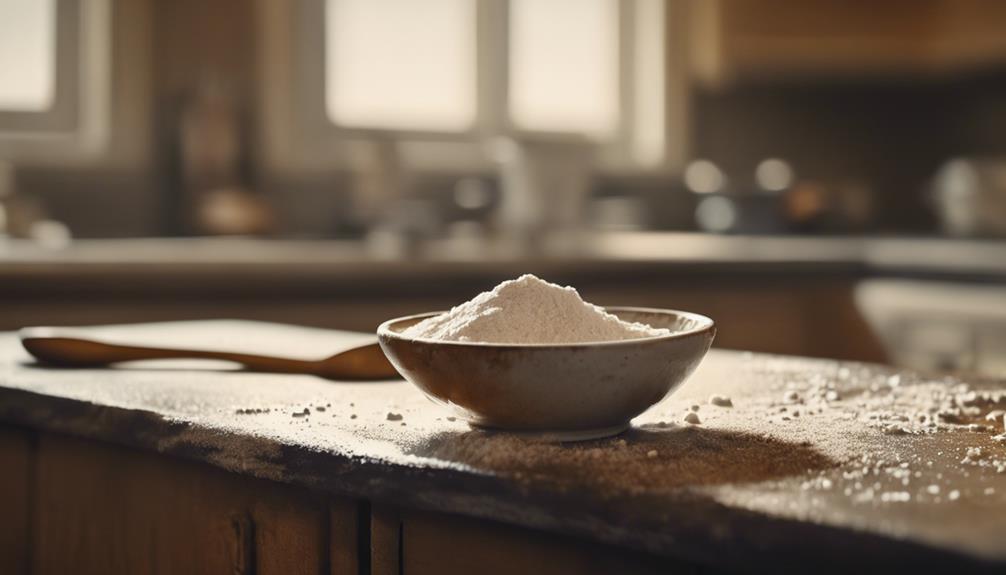You're looking for eco-friendly ways to remove grease from your kitchen surfaces. You're in luck! Natural ingredients like baking soda, vinegar, and castile soap are effective alternatives to harsh chemicals. For tough grease, try a baking soda paste or a castile soap and lemon juice combo. For everyday cleaning, dish soap does the trick. And for gentle cleaning, vegetable oil is the way to go. With these green methods, you'll be saying goodbye to stubborn grease stains in no time. Discover the perfect solution for your kitchen, and get ready to shine!
Natural Ingredients for Grease Removal
You can effectively tackle grease buildup in your kitchen using common household items that are gentle on surfaces yet tough on grime. Natural ingredients like baking soda, vinegar, and natural vegetable oil are perfect for the job.
For instance, mix baking soda with water to create a non-toxic paste that's safe for most kitchen surfaces. This paste is gentle yet effective in scrubbing away tough grease stains. Vinegar is another natural degreaser that can break down and remove grease from surfaces. You can also use it to dissolve stubborn grease stains.
Natural vegetable oil, on the other hand, can help dissolve grease, making it easier to wipe away. By incorporating these natural ingredients into your cleaning routine, you can maintain a grease-free kitchen without exposing your family to harsh chemicals.
With these eco-friendly alternatives, you'll be able to enjoy a cleaner, healthier kitchen environment.
Vinegar Solution for Greasy Surfaces
White distilled vinegar proves to be a potent natural degreaser for tackling greasy kitchen surfaces, capable of breaking down stubborn oil and grease stains with ease. You can use it to clean your kitchen surfaces without introducing harsh chemicals into your environment.
When you apply undiluted vinegar to greased surfaces and let it sit for 5-10 minutes, it helps loosen the grease, making it easier to wipe away. This eco-friendly and non-toxic solution is safe to use on most kitchen surfaces, but be cautious when using it on porous materials like unsealed stone countertops.
To get the best results, you can mix equal parts of water and vinegar in a spray bottle, spray it onto the greasy surface, and let it sit before wiping it clean. This natural solution will help you maintain a clean and hygienic kitchen without exposing yourself or your family to toxic chemicals.
Baking Soda for Tough Grease

For tackling the toughest grease stains on kitchen surfaces, baking soda proves to be a reliable and eco-friendly solution. You can create a paste by mixing baking soda with water, which becomes an effective abrasive cleaner for scrubbing away stubborn grease buildup. This gentle yet powerful paste is perfect for tackling greasy stovetops, ovens, and kitchen counters.
Simply sprinkle baking soda on the surface, add a bit of water to form a paste, and scrub away the grime. The baking soda will absorb and lift away the grease, leaving your kitchen surfaces sparkling clean.
You can also use baking soda as a preventative measure by sprinkling it on surfaces before wiping them down. This will help absorb any excess grease and grime, making cleaning a breeze. As an eco-friendly solution, baking soda is safe to use on a variety of surfaces and is a great alternative to harsh chemicals.
Castile Soap and Lemon Juice Combo
As you delve into the Castile soap and lemon juice combo, you'll want to find the perfect balance of soap to juice, so you can enhance its grease-fighting power.
You'll also uncover the fantastic benefits of lemon juice, from its ability to break down tough grime to its invigorating scent.
Soap and Juice Ratio
When combining Castile soap and lemon juice, you'll want to aim for a ratio of one tablespoon of Castile soap to two tablespoons of lemon juice, which creates an effective cleaning solution that's gentle on surfaces yet tough on grease.
This eco-friendly combo is perfect for tackling those pesky grease stains on your kitchen surfaces. The Castile soap, being plant-based, is gentle on the environment, while the lemon juice acts as a natural degreaser, cutting through tough grease stains and leaving a fresh citrus scent.
By mixing these two natural ingredients, you create a potent surfactant that breaks down grease and grime effectively. This natural cleaning solution is safe to use around children, pets, and food preparation areas in the kitchen.
With this ratio, you'll be able to create a powerful cleaning solution that's easy on surfaces but tough on grease.
Lemon Juice Benefits
By harnessing the natural degreasing properties of lemon juice, you can effectively cut through tough grease stains on kitchen surfaces without exposing yourself or the environment to harsh chemicals. The citric acid in lemon juice helps break down grease and grime, making it easier to clean and leaving a fresh scent.
This natural cleaning method is ideal for various kitchen surfaces, including countertops, sinks, and dishes.
When combined with Castile soap and water, lemon juice creates a potent cleaning solution that's safe for the environment. This eco-friendly alternative to harsh chemical cleaners is perfect for those looking for a non-toxic way to tackle grease removal in the kitchen.
With lemon juice, you can say goodbye to harsh fumes and toxins, and hello to a cleaner, healthier kitchen. By incorporating lemon juice into your cleaning routine, you'll be doing your part for the environment while keeping your kitchen sparkling clean.
Castile Soap Effectiveness
You can create a potent grease-fighting solution by combining Castile soap with lemon juice, a dynamic duo that effectively cuts through tough kitchen grime. This natural combination is safe for the environment and doesn't contain harsh chemicals or toxins.
As a biodegradable soap made from vegetable oils, Castile soap acts as a surfactant, helping to lift and remove grease from kitchen surfaces like dishes, countertops, and sinks.
When mixed with lemon juice, Castile soap creates a gentle yet powerful cleaning solution that's perfect for degreasing kitchen surfaces. The acidity in lemon juice helps break down grease, while Castile soap's surfactant properties lift it away, leaving your kitchen surfaces sparkling clean.
This natural combo is perfect for those who want to adopt a green cleaning routine without sacrificing effectiveness. With Castile soap and lemon juice, you can say goodbye to harsh chemicals and hello to a cleaner, greener kitchen.
Dish Soap for Everyday Cleaning

For everyday kitchen cleaning, you can rely on trusty dish soap to tackle light grease and grime on surfaces like countertops, kitchen tiles, and sinks. This gentle yet effective cleaning agent is perfect for daily maintenance, helping to guarantee the prevention of the buildup of tough stains.
Mix dish soap with warm water to create a soapy solution that breaks down and lifts away grease with ease.
When using dish soap for everyday cleaning, you'll appreciate its gentle nature, which won't damage most kitchen surfaces. Simply grab a soft sponge and scrub away at those pesky grease spots. The soap's mild formula ensures that your surfaces remain safe from harsh chemicals, making it an eco-friendly choice for your kitchen.
Salt and Isopropyl Alcohol Mix
When tackling tough grease stains on kitchen surfaces, combining salt and isopropyl alcohol creates a potent yet eco-friendly cleaning solution. This dynamic duo is a game-changer for your kitchen countertops, stovetops, and cabinets.
The salt acts as a natural abrasive, scrubbing away stubborn grease stains, while the isopropyl alcohol breaks down the grease and oil, making it easy to wipe away.
Here are just a few reasons why you'll love this method:
- You'll reduce your environmental impact with this eco-friendly solution
- It's a cost-effective way to tackle grease buildup in your kitchen
- The combination of salt and isopropyl alcohol is gentle on surfaces, yet tough on grease
- You can use it on a variety of kitchen surfaces, from countertops to stovetops
- It's a natural and non-toxic way to keep your kitchen clean and green
Flour and Water Grease Remover

Now that you've decided to use the flour and water grease remover, it's time to get started!
You'll need to mix the solution by combining the right amounts of flour and water, then applying the paste to the greasy area.
As you work through these steps, you'll be amazed at how effectively this natural solution tackles kitchen grease.
Mixing the Solution
You can create a potent grease-fighting paste by combining flour and water to form a thick, absorbent consistency. This mixture is a game-changer when it comes to removing tough grease stains from your kitchen surfaces.
When you mix flour and water, you'll get a paste that's perfect for soaking up fresh grease spills.
Here's why you'll love this method:
- Say goodbye to stubborn grease stains that refuse to budge
- Remove grease without using harsh chemicals or abrasive cleaners
- This method is gentle on surfaces, making it perfect for cleaning delicate areas
- You can use this paste to clean hardened grease on pots, pans, and baking sheets
- And the best part? You'll be using a natural, non-toxic cleaner that's safe for your family and the environment
Applying the Paste
Apply the flour and water paste directly to the greasy area, making sure to cover it evenly, and let it sit for a few minutes to allow the paste to lift the grease. This paste is a great way to absorb immediate grease spills, and it's safe for use on countertops, stovetops, and other kitchen surfaces.
After letting the paste sit, gently scrub it with a damp cloth or sponge to remove the grease residue. Be gentle, as you want to avoid spreading the grease around. As you scrub, you'll start to see the grease break down and lift away from the surface.
If the grease stain is particularly stubborn, you may need to repeat the process a few times to get it fully removed. But don't worry, with a little patience and elbow grease, you'll be able to get rid of even the toughest grease stains using this simple, eco-friendly method.
Vegetable Oil for Gentle Cleaning
Your kitchen's toughest grease stains don't stand a chance against the gentle yet potent cleaning power of vegetable oil. This natural and eco-friendly solution is a game-changer for removing grease stains without harsh chemicals.
Simply apply vegetable oil to a paper towel and gently wipe away the stain. The oil will break down and lift the grease, leaving your surfaces clean and residue-free.
Here are just a few reasons why you'll love using vegetable oil for gentle cleaning:
- Effective and gentle: Vegetable oil is tough on grease, yet gentle on surfaces.
- Eco-friendly: Ditch the harsh chemicals and opt for a natural, eco-friendly solution.
- Multi-surface friendly: Use vegetable oil to remove grease from countertops, cookware, and appliances.
- Easy to use: Simply apply, wipe, and repeat for a sparkling clean finish.
- Shines like new: Follow up with a natural cleaning method like vinegar or baking soda for a streak-free shine.
Conclusion
You've made it through the list of green methods for kitchen grease removal! With these eco-friendly solutions, you can ditch harsh chemicals and still get the job done.
Did you know that the average American uses about 40 pounds of cleaning products per year? By switching to natural ingredients, you'll not only reduce your environmental footprint but also create a healthier kitchen environment.
Now, get cleaning and go green!